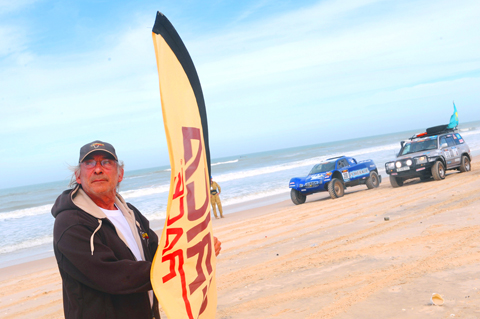On the banks of Senegal’s Lac Rose, the traditional finish for the Dakar Rally, the worrying sound of livelihoods disappearing has replaced the noisy din of car and motorcycle engines.
After hosting the climax of the world’s most grueling and dangerous desert race since the start of the 1980s, this year’s Dakar was switched to South America after a series of terror attacks in Mauritania compromised the event’s security.
As a result, instead of hundreds of competitors and camp-followers gleefully pouring desperately-needed hard currency into this west African state, the area is virtually deserted.

PHOTO: AFP
The only engines being heard this year are those of the local salt trucks.
“Not having the rally come here anymore is a huge blow. It brought in a lot,” said Assane Kane, the president of the village giftmakers and craftsmen who could “make around 250,000 West African [CFA] francs [US$500] in just one day” from the visitors.
Aliou Oumar Ndiaye, the owner of Chez Salim, is also nostalgic for the boost that the race brought.
“Financially, we could make 10 to 15 times more a month,” he said, reflecting on a second successive year when the rally has been missing.
Last year, the Dakar was canceled at the last minute following the murders of four French tourists by al-Qaeda-linked militants in Mauritania.
“There were repercussions as the rally’s loss means a shortfall for our hotel,” Ndiaye said.
A former campsite owner Idrissa Diop believes that the final stage of the rally would mean around 200-300 extra people gathered at Lac Rose.
“That could mean doing 5 million CFA francs a day,” he said.
In the craftsmen’s village, Cheikh Ba has spent the last 12 years selling traditional musical instruments and paintings.
One design, showing a silhouette of two desert nomads, bears the inscription “Lisbon-Dakar 2008.”
“I didn’t sell any of them last year,” Ba said.
Many businessmen in Senegal believe the loss of the Dakar will have major financial repercussions for the whole of the country, not just the region here.
“The rally was a major promotional event for Senegal throughout the world. People knew about the Dakar,” said El Hadj Malick Mbaye, the head of the national tourist authority.
Despite the gloom, Lac Rose will still enjoy a taste of motorsport this year.
At the weekend, a new competition, the Africa Race, the brainchild of former triple Dakar winner Hubert Auriol, was due to finish here.
But the Senegalese media refused to get too excited about the event which followed the trail from France to Senegal via Morocco and Mauritania and only boasted a small number of entrants.

Shohei Ohtani and Clayton Kershaw on Friday joined their Los Angeles Dodgers teammates in sticking their fists out to show off their glittering World Series rings at a ceremony. “There’s just a lot of excitement, probably more than I can ever recall with the Dodger fan base and our players,” manager Dave Roberts said before Los Angeles rallied to beat the Detroit Tigers 8-5 in 10 innings. “What a way to cap off the first two days of celebrations,” Roberts said afterward. “By far the best opening week I’ve ever experienced. I just couldn’t have scripted it any better.” A choir in the

After fleeing Sudan when civil war erupted, Al-Hilal captain Mohamed Abdelrahman and his teammates have defied the odds to reach the CAF Champions League quarter-finals. They are today to face title-holders Al-Ahly of Egypt in Cairo, with the return match in the Mauritanian capital, Nouakchott, on Tuesday next week. Al-Hilal and biggest domestic rivals Al-Merrikh relocated to Mauritania after a power struggle broke out in April 2023 between the Sudanese army and a paramilitary force. The civil war has claimed tens of thousands of lives and displaced more than 12 million people, according to the UN. The Democratic Republic of the Congo-born Al-Hilal

Shohei Ohtani, Teoscar Hernandez and Tommy Edman on Thursday smashed home runs to give the reigning World Series champions the Los Angeles Dodgers a 5-4 victory over Detroit on the MLB’s opening day in the US. The Dodgers, who won two season-opening games in Tokyo last week, raised their championship banner on a day when 28 clubs launched the season in the US. Dodgers manager Dave Roberts shuffled his batting lineup with all four leadoff hitters finally healthy as Ohtani was followed by Mookie Betts, then Hernandez and Freddie Freeman in the cleanup spot, switching places with Hernandez. “There’s a Teoscar tax to

Matvei Michkov did not score on Monday, but the Philadelphia rookie had a hand in both goals as hosts the Flyers earned a 2-1 victory over the Nashville Predators. Ryan Poehling and Jamie Drysdale got the goals for the Flyers (31-36-9, 71 points), who won their third straight. Michkov and Travis Konecny assisted on both. Ivan Fedotov stopped 28 shots to earn his first win since March 1, ending a personal six-game losing streak. Zachary L’Heureux got the lone goal for Nashville. Michael McCarron and Brady Skjei got the assists for the Predators (27-39-8, 62 points), who have just four goals in their